You Can Stop Your Second Screen Experience Now, Twitter
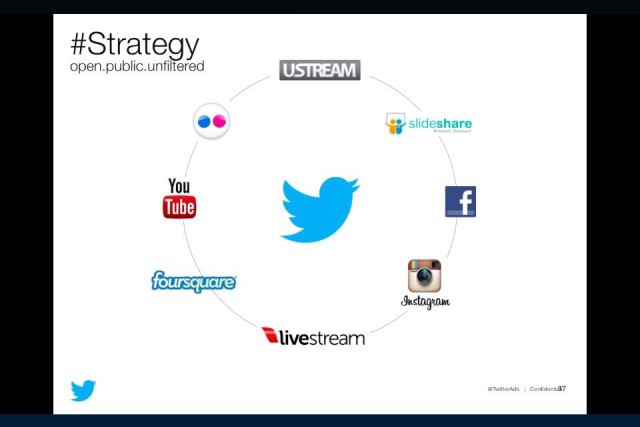
Would you believe it if I… theorized the web to understand that people tweeting about things on TV does not lead to more people watching those things on TV? How about this idea for cause and effect: What if “a show’s ratings are more likely to drive activity on social media rather than vice versa”? Well that’s what NBC is deciding.
But but but! What about this amazing money quote from Twitter money-making honcho Adam Bain last year? “We often have thought about Twitter plus TV, but we are now thinking about Twitter times TV.” Haha oops.
What if Twitter is the big beast that straight-up MySpaces in a couple of years? Lots of us have been living in panic of the end of the Facebook era, which shows no signs of actually ending, of course, particularly since it has so many years of content that users reference again and again. Twitter doesn’t have your baby pictures though. Maybe we should be side-eying Twitter a lot harder.
Of Mice and Men Must Die
“In research published online April 28 in Nature Methods, the scientists report that the presence of male experimenters produced a stress response in mice and rats equivalent to that caused by restraining the rodents for 15 minutes in a tube or forcing them to swim for three minutes. This stress-induced reaction made mice and rats of both sexes less sensitive to pain. Female experimenters produced no such effects.” The senior author of the paper, Jeffrey Mogil, suggests that the “problem is easily solved” but curiously, he doesn’t suggest the easiest solution of all, which is to simply ban men.
Vaunted College Newspaper Now More Like Real Newspapers
by Betsy Morais

Nights at the Columbia Daily Spectator were spent in a breathless, tipsy, exhausted, self-important haze. The office, like that of many college newspapers, was a clubhouse run by flighty, inexperienced, earnest kids who were behind on their homework. There was an idea that we should be finished by three a.m. in order to send the paper to the printing press. That was the goal post, anyway. In the meantime, we ate pizza from V&T’s (which we got for free in exchange for a daily ad); drank Blue Moons (which we got for cash); argued, gossiped, and fell in love with one another while we waited for the stories to be filed. Office romances were known as Speccest. Parties were called Spectails. The executive office was sort of accurately referred to as the panopticon. The printer was named Boobear. As the hours passed, you could almost forget about one of the promised rewards for your labor: seeing your name in print.
Last week, the Spectator’s young wardens — the editor-in-chief, managing editor, and publisher — summoned the staff for a grave announcement: they intended to stop printing the paper five days a week. Instead, they said, they will run articles online daily, and publish a print edition weekly. The idea was the product of readership surveys, falling ad sales, and, more recently, conversations with the Spectator’s elders — past editors and members of the Board of Trustees. The board’s chair is Wendy Brandes, a former editor of the Arts & Entertainment section who has since become a jewelry designer and the wife of Paul Steiger, ex- Wall Street Journal managing editor and the founder of ProPublica. After the Journal and the New York Times quoted Brandes about the decision — “It doesn’t matter if you love or hate the Internet — it’s here,” she declared — she wrote on her blog that she always wanted to be mentioned in these papers, though not for this: “I AM in the New York Times, but I am talking about my college newspaper’s website strategy instead of my stunning jewelry inspired by powerful women.”
The Times wrote, “The announcement has pitted a group of the paper’s alumni who are angered by the decision, seeing it as a travesty against those who view the move as a necessary embrace of the digital age.” These two sides are divided roughly by generational lines. My friends, most of whom graduated within the past five years or so, largely tweeted their praise for the Spectator’s evident foresight and guts. On the other hand, John R. MacArthur, a trustee who graduated in 1978, and is now the publisher of Harper’s, had this reaction: “I am quite simply appalled by the arrogant, presumptuous tone of the board members, and the staff, who want so blithely to dispense with more than a hundred years of tradition.”
Columbia, situated as it is in New York City, is kind of a microcosm of the crowded, boisterous media market that surrounds the campus: There’s the Spectator, the Eye, Bwog, The Blue & White, The Barnard Bulletin, and The Lion, plus the more academic-minded magazines and journals, the humor publications, and so on. There are rivalries, traitors, and attempts to lure talent; there’s link-baiting, fact-stealing, and a lot of disinterest on the part of casual readers with exams on their minds. (My beat was the Manhattanville expansion project; I’d have to forgive non-Spec friends for skipping my dispatches from Community Board 9 meetings.) If the media environment at Columbia holds up a mirror to the real world, then at least it rewards smarts and ingenuity, which are sometimes equal to good old-fashioned reporting of the kind you might learn how to do on the college paper.
The Spectator’s headquarters is off campus, on the corner of Broadway and 112th Street, and you should only take the elevator once you’ve earned the right. (There’s no formal initiation, but if you haven’t cried in the bathroom, you’re probably taking the stairs.) My first assignment was an interview with the president of Tanzania, who was coming to campus as part of a program called the World Leaders Forum. The day before the event, the president cancelled his visit. I was so visibly crushed that the news editor told me I could write a story about how disappointing it was that the president of Tanzania did not show up. This is to say: the Spectator is fraternity-lite; it operates on a kind of social currency, a sense of calling to tradition and the moral, civic dutifulness-of-it-all, combined with the empathy and back-patting of a sports team (not that Columbia’s athletic department provides much of an example). When actual money was lacking, there was always just enough of that other stuff to press on.
When news broke of the switch to publish online, there seemed to be some confusion as to whether the Spectator would still be the Daily Spectator — which it indeed will be, even without the ink. Reporters will scramble, news editors will tear their hair out, and sports columnists will scream — except instead of aiming for that 3 a.m. sendoff to the printer, they’ll be doing so around the clock; a veritable education in modern journalism. It’s a bummer that the Spec will no longer offer the same privilege of seeing your name printed in the morning’s paper, which Diana Klos, executive director of the National Scholastic Press Association, told the Journal is an “increasingly a niche product.” So is reporting, and so is editing. Doing away with those would be a terrible break in tradition, don’t you think?
Over the weekend, the board made its final ruling, making the Spectator the first major Ivy league paper to cease printing a daily paper. (MacArthur voted nay, of course.) And so, an email appeared in my inbox Sunday evening, as there was no need to wait for a morning paper delivery: “We are excited to announce several significant changes to the Columbia Daily Spectator that will take place this fall semester.” A party is planned for this Sunday. The editors wrote, “By untying ourselves from the daily print production schedule, we will free editors and writers to focus on providing our readers with the stories they want through the medium they prefer.”
As I read the announcement, made official in pixels, I drifted toward a familiar angst: How many articles will go up every morning? How will they maintain a steady schedule of stories? What will prospective recruits make of this — or won’t they notice at all, since they’re accustomed to reading on screens? Then I recalled a throwaway comment made by a New York Times reporter who bought me a coffee on Capitol Hill when I was a summer intern working (online) at the Washington Post. I had asked how it felt to see his byline appear on A1. I expected him to sigh dreamily and say something like, “The thrill never dies, kid.” Instead, he shrugged, and said it was exciting at first, but now he hardly stops to look at it. Time rushes by, and there’s so much work to be done.
Betsy Morais is on the editorial staff of the New Yorker. She was a Speccie.
Photo by Marion Doss
Moment Captured
“The end of evolution awaits in a wasteland dominated by bizarre trash formations, dust and rock. From the scattered remains of a long forgotten culture an electric ecosystem rapidly evolves into the ultimate form of existence.”
The West Coast Plot To Destroy New York City

April 27, “Despite Big Ambitions, New York’s Tech Scene Is Still Starting Up”:
[I]nvestors are still betting on the city. The amount of venture, angel and private equity money invested in New York soared about 200 percent from 2009 to 2013, to $3 billion from $799 million, according to CB Insights, a data analysis firm that specializes in venture capital trends. Silicon Valley, by contrast, took in $11.4 billion in 2013.
April 22, “David Einhorn: ‘We Are Witnessing Our Second Tech Bubble in 15 Years’”:
“There is a clear consensus that we are witnessing our second tech bubble in 15 years,” said Mr. Einhorn of Greenlight Capital Inc. “What is uncertain is how much further the bubble can expand, and what might pop it.”
April 27, “Despite Big Ambitions, New York’s Tech Scene Is Still Starting Up”:
Mr. Botha said he had not seen anything to discourage him from thinking that New York would eventually end up an important hub of the tech industry.
April 22, “David Einhorn: ‘We Are Witnessing Our Second Tech Bubble in 15 Years’”:
He described the current bubble as “an echo of the previous tech bubble, but with fewer large capitalization stocks and much less public enthusiasm.”
March 9th, “Is San Francisco New York?”:
It’s hard to pinpoint the exact moment that San Francisco morphed into bizarro-world New York, when it went from being the city’s dorky, behoodied West Coast cousin to being, in many ways, more New York–ish than New York itself — its wealth more impressive, its infatuation with power and status more blinding.
A grand, subtle, masterful psychological war playing out right beneath our noses, just behind our phones. Who knew!
An Inconvenience In Queens
An Inconvenience In Queens
by Natalie McMullen
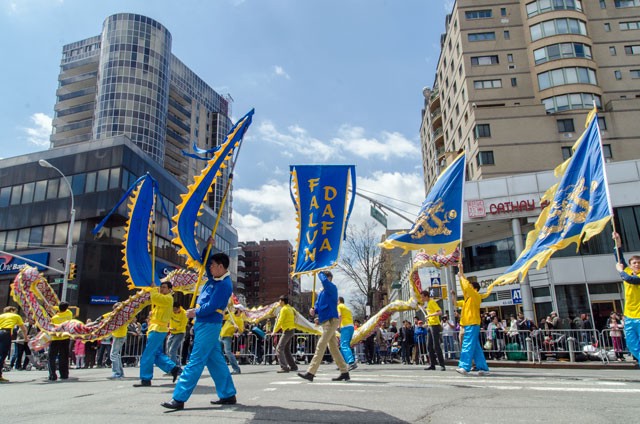
Dozens called foul in Flushing, Queens on Saturday, unable to cross Main Street due to a parade of nearly 1,000 Falun Gong practitioners protesting persecution in China.
Police refused to allow onlookers to cut across the rally, saying only they might be held for up to 45 minutes.
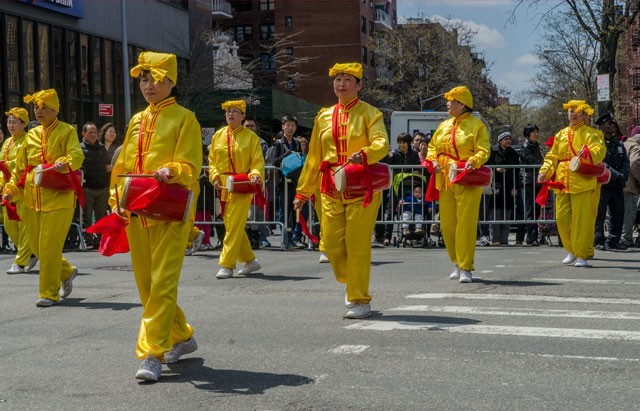
“I had to be somewhere at 12:30,” cried one lady.
A little boy clamoring at the metal gates set up to contain the crowds implored, “I have to pee!” “Then go find a washroom,” said the visibly irritated officer.
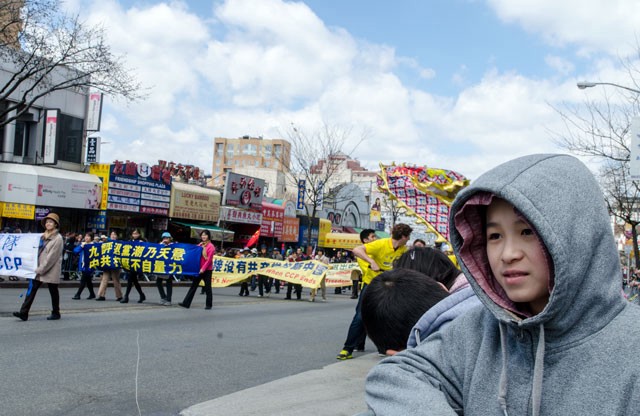
Another cop, when asked by a woman who appeared to be sporting a mild bloat, whether he was seriously going to make her go around the long way, replied only, “Sorry ma’am, I really couldn’t tell.”
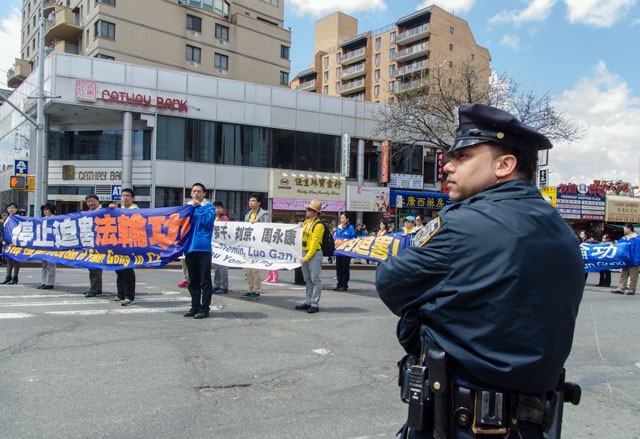
The same officer was later seen rolling his eyes, calling the anxious pedestrians “disrespectful and impatient.”
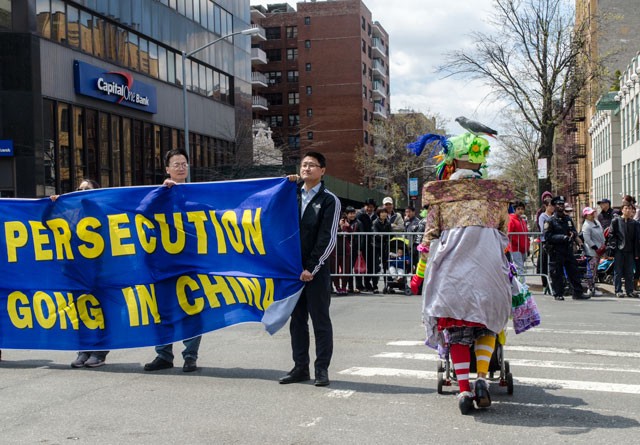
Growing tensions between civilians and the NYPD were tempered when a man with flair and pizazz arrived on scene.

Natalie McMullen is a street photographer, culture critic and food writer. She is an archivist of the resonant, a nerdy polisher of words, and a lifelong scholar on love and relationships. She is currently resident photographer at The Awl.
Who Will Save the Airbnb Faithful?
Who Will Save the Airbnb Faithful?
by Brendan O’Connor
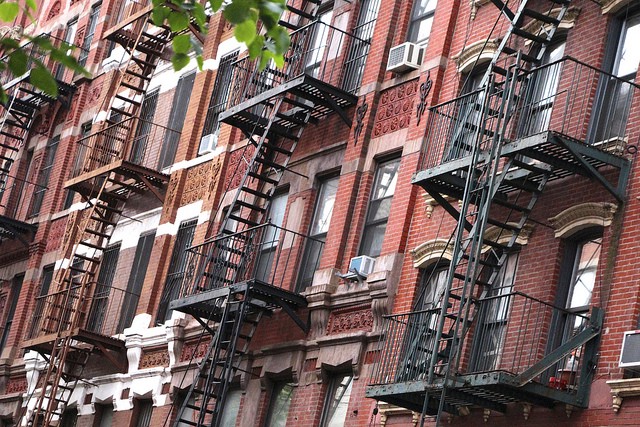
In October, New York State Attorney General Eric Schneiderman issued a subpoena to Airbnb, ordering it to turn data about its 15,000 registered hosts in New York over to the state. While neither Airbnb nor its hosts pay the 15 percent lodging tax that most New York City hotels are subject to — no small part of the reason why startups like Airbnb have been able to “disrupt” the established hospitality industry — the attorney general’s primary concern was not the stream of potential tax revenue trickling past the state’s coffers. (Airbnb kindly offered to induce its users to pay the tax, which would amount to some $21 million.)
Rather, it’s that Airbnb encourages potential violations of the 2010’s “Illegal Hotels Bill,” which made it unlawful to rent out units in Class A multiple dwellings — apartments, basically — for fewer than 30 consecutive days. (In 2012, for example, New York City won a $1 million suit against Smart Apartments, an illegal hotel company which is now banned from operating.) Last week, settlement negotiations between the Attorney General’s office and Airbnb broke down, and Airbnb, whose IPO is seemingly on the horizon following a recent $10 billion valuation, is now in federal court.
On Wednesday, Airbnb hosted a “community meetup” at the WeWork Lounge in Lower Manhattan. Nearly 250 people registered for the event; the line for snacks extended out of one room into another. Most of the attendees, a mix of hosts and users, simply wanted to know how scared they should be of the Big Bad Attorney General. There was much confusion about who was subject to which laws (a woman who lives in a one-bedroom apartment in Brooklyn was under the impression that the laws did not apply to her); which laws have been broken (a former tax accountant berated everyone for being too stupid to understand New York’s tax codes); and who might go to jail (probably not Airbnb executives!).
According to Airbnb’s head of public policy, David Hantman, all of these questions — any question that anyone could have about Airbnb, really — could ultimately be reduced to one: “Does the attorney general get to push our community around and attack regular New Yorkers?” He added, “Because if we don’t stand up and he wins the press narrative and every other narrative, and he’s running for whatever he’s running for, they’ll use that data to do whatever he wants with it.”
What does the attorney general want to do with the data? Hantman reported that, in the course of those negotiations, when Airbnb asked what the attorney general wanted with it, the attorney general got offended. “They got their backs up,” he told the crowd. “They said, ‘We don’t have to tell you anything. We looked at this and we think that people are breaking the law, so we want the data.’” A spokesperson for the attorney general told me via email, “We are investigating illegal activity on Airbnb’s website. Airbnb has resisted cooperation — unlike other companies, such as Yelp and Facebook, who worked with us to root out illegal activity. Hence, the need for a subpoena to Airbnb itself.” The subpoena — which Hartman has described as “overbroad” — was “narrowed to seek information only about Hosts that would be violating the law,” according to the attorney general’s memo in opposition to Airbnb’s motion to quash the subpoena.
At the meetup, Hantman avoided using phrases like “illegal” or “violating the law.” He preferred, instead, to talk instead about “bad actors” without precisely defining the term: “Honestly if you ask the attorney general who a ‘bad actor’ is, I think he would just apparently say, ‘All New Yorkers.’” Airbnb, he added, is “using the term, maybe we shouldn’t, because it’s his term.” (According to a spokesperson from the attorney general, however, Airbnb introduced it in a blog post last October.)
A man in a fitted, button-down shirt and tie — which may or may not be the sort of thing a bad actor might wear — asked, “What is Airbnb’s view of an entrepreneur who does an improvised hotel operation, has amazing quality, whoever comes to his apartment loves it 100%, what is the view?” Answering his own question, he said, “It’s illegal in New York.”
Someone shouted back, “This guy is a plant for the DA!” before Hantman could respond. “We are constantly looking at our community to make sure people are providing the kind of experience we want them to provide, and, if they’re not providing it, we’re removing them,” he said. That’s all we can answer today.”
But Airbnb’s view of bad users is not necessarily aligned with the state’s: Of course it behooves Airbnb to enforce a baseline standard of hospitality, which it already does to some degree with its rating system. If your apartment is gross, you will get bad ratings; if you have bad ratings, people will not want to stay at your apartment. The less this happens, the better for Airbnb’s business.
Unlike the so-called slumlords targeted by Airbnb’s internal enforcement mechanisms, however, hosts who frequently list multiple properties with grand amenities in gentrifying and gentrified neighborhoods and can charge exorbitant rates — which, again, are not subject to hospitality taxes and from which Airbnb derives its fee — are very good for business. But the more this happens, the fewer apartments enter an already crushed housing market, the higher the rent ceiling goes, and the more cities like New York become enormous Epcot versions of themselves. Hantman denied that such “improvised hotel operations” exist, claiming that 87 percent of Airbnb hosts have only one listing, and that the vast majority of the rest have only two.
But that percentage refers to the number of users, not the shape of Airbnb’s business; Airbnb has not disclosed how much of its revenue is accounted for by the 13 percent of users with multiple listings. “We had a small number who had many listings, and now they are gone,” Hantman said, referring to the fact that Airbnb removed some 2,000 listings earlier this year. “These hosts weren’t making their neighborhood stronger and they weren’t delivering the kind of hospitality our guests expect and deserve,” Airbnb spokesman Nick Papas later told me via email. “In some cases, they were making communities worse, not better.”
“We in this room know the truth,” Hantman said. “And the truth is that this is a group of good people doing good things for the city, bringing the city back and helping their own families survive in a tough world.” Again, Hantman invoked the language of unity and solidarity. “This is a case not even against us. It’s for your information,” he said. “And we are refusing to turn it over.” (Cue applause.) “To us, it’s about the hosts. It’s about the community,” he said. “He’s not prosecuting us. We are keeping him from you. We’re all in this together.”
“If we make ourselves known,” one woman then shouted from the crowd, “how are we protected?” (“Unfortunately, we can’t provide legal assistance or review lease agreements for our 500,000 hosts,” Papas told me later. “But we do try to help inform people about these issues.” Nitasha Tiku at Valleywag found some of Airbnb’s warnings lacking however.)
One man in the audience concluded a ringing monologue by saying, “You can’t stop a revolution, as proven by what’s going on in the Middle East. It’s gonna happen. Tax us or not, but it’s gonna happen.”
“I’m a closet revolutionary,” responded Douglas Atkin, Global Head of Community and Mobilization and author of a book titled The Culting of Brands: How To Turn Your Customers Into True Believers. “So I love what you’re saying.”
“Why is no one talking about what Airbnb did during Sandy?” a celebrity photographer, who claimed to have skipped taking pictures of the set of “Girls” to be at the meetup, asked at one point. “I thought that was great! Essentially Airbnb was being used as a public service. Why is no one mentioning the potential for public service in place?”
“What happens is when people pay attention, they’re on our side,” Hantman said. “People saw what happened with Sandy and thought, ‘Oh, why would we go against these people?’ And then it wore off. So maybe we should talk about it more.”
“This is like the Palestine-Israel thing,” said one woman, who looked as though she might have made the trip down from the Upper East Side. “Israel doesn’t get any good press. You deserve a lot better press than you’re getting.”
“If you look at the marketplace, we do the most,” Hantman said. “We have the most transparency, and we have the best guarantee, and we have the best hosting community. And we’ve somehow become the target.”
One audience member questioned this kind of rhetoric. “You say, ‘We’re doing it for you.’ But I’m sure you’re not just doing it for us. You’re doing it for yourselves as well, for your business,” she observed. “It’s not just for our community. If you don’t have us, you don’t make money.”
“It’s about money,” she said. “New York City is about money.”
Brendan O’Connor is a reporter in New York.
Photo by Jacob Steinschaden via Flickr Creative Commons
New York City, April 24, 2014

★★★ The wind and sun carried on enthusiastically and at cross purposes. A diffuse but still coherent contrail laid a thick seam along the middle of the sky. Yellow tulips were up and open inside the fence on Sherman Square. A flattened gallon jug went banging end over end along the roadway. Down in the subway, the sun through the grate picked out every detail, each wrinkle or cigarette butt, in the garbage-cistern between the rails. On the way aboveground, in Brooklyn, petals blew down the stairway. They were falling like a pink-tinted snow flurry outside the museum. A red-tailed hawk banked and circled across the street, its tail flashing rust. The wind was roaring in the ears. By the return to Manhattan, the yellow tulips had shut down for the evening.
British Corpses Extra Bloaty
“A British parish council is the first in the UK set to dedicate part of a proposed new cemetery to obese corpses as crematoriums, morgues and ambulance chiefs gear up for bigger bodies.”
